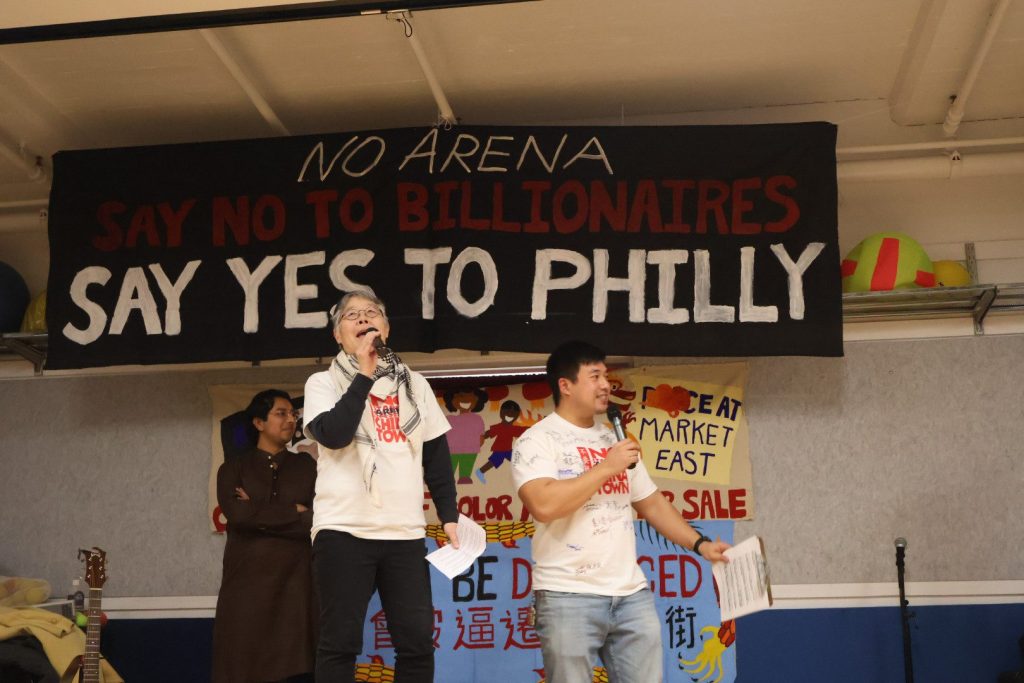By Andrew Lee
Last October, activist Debbie Wei described 76 Place as an “existential” threat to Philadelphia’s Chinatown. In a profile for Love Now Media, she proclaimed that the fight to stop 76 Place was “just getting started,” though the intensely controversial proposal for a Center City basketball arena had garnered the support of most city council members together with Mayor Cherelle Parker. In December, Philadelphia City Council voted 12-4 to approve 76 Place after arresting dozens of protesters. But as Debbie predicted, arena opponents vowed to continue the fight despite legislative approval. The very next day, a two-story banner proclaiming “76 Place Will Never Be Built: Stop Land Grabs, from Philly to Palestine” was deployed off of a downtown parking garage. Just over three weeks later, that declaration—and Debbie—would be proven true.
Despite being framed as a “done deal” for months, 76 Place was unexpectedly canceled on January 12th. The elected officials who went to bat for the profoundly unpopular development seemed as bewildered as the rest of the city. Councilmember Jimmy Harrity reported being “livid” at being “used like a pawn,” while his colleague Mark Squilla went so far as to say that he was “OK being used.”
While Philadelphia’s elected officials bemoaned their fate, the mood was celebratory on Tuesday, January 14th as hundreds of arena opponents filled Chinatown’s Folk Arts-Cultural Treasures Charter School (FACTS) to celebrate the demise of 76 Place.
“I feel like a boot has come off of my neck,” said Ellen Somekawa, FACTS Executive Director. “The movement that this has built is so inspiring, and the breadth of allies and forces and people that mobilized to fight this thing is so promising. This struggle was really brutal and really tough for everyone involved, but we come out of it on the other side with a stronger movement, a movement that goes across neighborhoods, races, and ethnicities.”

Other activists who spoke to Love Now Media echoed Somekawa’s remarks about the importance of solidarity and the ongoing struggle for housing justice in Philadelphia.
“We learned a lot about solidarity, and we learned, once again, that all skinfolk ain’t kinfolk. The pressure to create racial divides between Black and Asian Philadelphians was not successful, and many city leaders who trafficked in that rhetoric and stereotypes should be ashamed,” declared Akira Drake Rodriguez of Black Philly 4 Chinatown.
Defeating 76 Place and defending Chinatown “really means a lot,” said Sterling Johnson of Philadelphia Housing Action, especially since Chinatown was founded at a time when racist legislation barred Chinese residency in many neighborhoods. “That kind of stuff has happened to Black people, too, so we have a little bit of a feeling about that. When we know that other people have gone through that, we’re going to stand up. We’ve seen firsthand with the [University City] Townhomes, Chinatown stood with us. They stood with Black Philly. So we’re going to keep going.”

On Tuesday, organizer and former University City Townhomes resident Melvin Hairston said “words can’t describe” his feelings. “This is a testament to the people and their hard work. This shows that we do have the power to make change. No matter how much money is out there, we have the power to preserve our communities.”
The shared commitment to furthering the struggle against gentrification is crucial. It’s not like the billionaire owners of the Sixers suddenly had a change of heart and started listening to the community. 76 Place died during negotiations between two corporate behemoths, the 76ers and Comcast. While it’s profoundly depressing that such backroom deals shape the future of our city, this is nothing new. It’s simultaneously true that the solidarities reinforced by the successful anti-arena fight may prove crucial during the political tumult expected in the coming years.
“The solidarity is incredibly important because the fight is always going to be long term. It’ll be decades, generations long. It’s never going to be about one single issue, so it’s trying to find patterns across multiple issues here, in our own neighborhoods, but also across the city, across the state, federally, and internationally,” said Elena Emelchin of No Arena in Chinatown Solidarity and the Brewerytown Sharswood Neighborhood Coalition. “This is one small win. At the same time, the fight still continues, because there’s land grabbing still happening.”
ABOUT THE AUTHOR